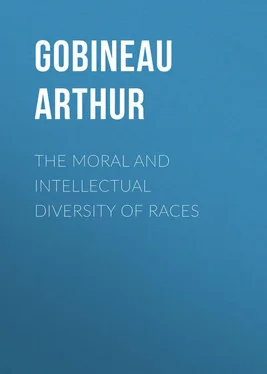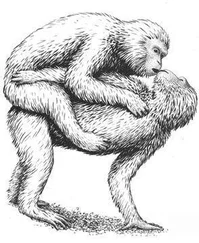Arthur Gobineau - The Moral and Intellectual Diversity of Races
Здесь есть возможность читать онлайн «Arthur Gobineau - The Moral and Intellectual Diversity of Races» — ознакомительный отрывок электронной книги совершенно бесплатно, а после прочтения отрывка купить полную версию. В некоторых случаях можно слушать аудио, скачать через торрент в формате fb2 и присутствует краткое содержание. Жанр: История, foreign_antique, foreign_prose, на английском языке. Описание произведения, (предисловие) а так же отзывы посетителей доступны на портале библиотеки ЛибКат.
- Название:The Moral and Intellectual Diversity of Races
- Автор:
- Жанр:
- Год:неизвестен
- ISBN:нет данных
- Рейтинг книги:4 / 5. Голосов: 1
-
Избранное:Добавить в избранное
- Отзывы:
-
Ваша оценка:
- 80
- 1
- 2
- 3
- 4
- 5
The Moral and Intellectual Diversity of Races: краткое содержание, описание и аннотация
Предлагаем к чтению аннотацию, описание, краткое содержание или предисловие (зависит от того, что написал сам автор книги «The Moral and Intellectual Diversity of Races»). Если вы не нашли необходимую информацию о книге — напишите в комментариях, мы постараемся отыскать её.
The Moral and Intellectual Diversity of Races — читать онлайн ознакомительный отрывок
Ниже представлен текст книги, разбитый по страницам. Система сохранения места последней прочитанной страницы, позволяет с удобством читать онлайн бесплатно книгу «The Moral and Intellectual Diversity of Races», без необходимости каждый раз заново искать на чём Вы остановились. Поставьте закладку, и сможете в любой момент перейти на страницу, на которой закончили чтение.
Интервал:
Закладка:
41
Augustin Thierry, Récit des Temps Mérovingiens . (See particularly the History of Mummolus .)
42
Lucretius was the author of De Rerum Natura , and one of the most distinguished of pagan "free-thinkers." He labored to combine the philosophy of Epicurus, Evhenius, and others, into a sort of moral religion, much after the fashion of some of the German mystics and Platonists of our times. – H.
43
Cæsar, whose private opinions were both democratical and sceptical, found it convenient to speak very differently in public, as the funeral oration in honor of his aunt proves. "On the maternal side, said he, my aunt Julia is descended from the kings; on the paternal, from the immortal gods. For my aunt's mother was of the family of the Martii, who are descended from King Ancus Martius; and the Julii, to which stock our family belongs, trace their origin to Venus. Thus, in her blood was blended the majesty of kings, the most powerful of men, and the sanctity of the gods, who have even the kings in their power." — Suetonius , Julius , 5.
Are not these sentiments very monarchical for a democrat; very religious for an atheist?
44
It is well known that Constantine did not receive the rite of baptism until within the last hours of his life, although he professed to be a sincere believer. The coins, also, struck during his reign, all bore pagan emblems. – H.
45
Acts xxvi. 24, 28, 31.
46
It will be understood that I speak here, not of the political existence of a centre of sovereignty, but of the life of an entire nation, the prosperity of a civilization. Here is the place to apply the definition given above, page 114.
47
This assertion will appear paradoxical to those who are in the habit of looking upon Spain as the type of hopeless national degradation. But whoever studies the history of the last thirty years, which is but a series of struggles to rise from this position, will probably arrive at the same conclusions as the author. The revolution of 1820 redeems the character of the nation. "The Spanish Constitution" became the watchword of the friends of constitutional liberty in the South of Europe, and ere thirteen months had fully passed, it had become the fundamental law of three other countries – Portugal, Naples, and Sardinia. At the mere sound of those words, two kings had resigned their crowns. These revolutions were not characterized by excesses. They were, for the most part, accomplished peacefully, quietly, and orderly. They were not the result of the temporary passions of an excited mob. The most singular feature of these countries is that the lowest dregs of the population are the most zealous adherents of absolutism. No, these revolutions were the work of the best elements in the population, the most intelligent classes, of people who knew what they wanted, and how to get it. And then, when Spain had set that ever glorious example to her neighbors, the great powers, with England at the head, concluded to re-establish the former state of things. In those memorable congresses of plenipotentiaries, the most influential was the representative of England, the Duke of Wellington. And by his advice, or, at least, with his sanction, an Austrian army entered Sardinia, and abolished the new constitution; an Austrian army entered Naples and abolished the new constitution; English vessels of war threatened Lisbon, and Portugal abolished her new constitution; and finally a French army entered Spain, and abolished the new constitution. So Naples and Portugal regained their tyrants, and Spain her imbecile dynasty. For years the Spaniards have tried to shake it off, and English influence alone has maintained on a great nation's throne, a wretch that would have disgraced the lowest walks of private life. But the day of Spanish liberty and Spanish independence will dawn, and perhaps already has dawned. The efforts of the last Cortes were wisely directed, and their proceedings marked with a manliness, a moderation, and a firmness that augur well for the future weal of Spain. – H.
48
Who is not reminded of Oxenstierna's famous saying to his son: "Cum parva sapientiâ mundus gubernatur." – H.
49
It is obvious that so long as the vitality of a nation remains unimpaired, misgovernment can be but a temporary ill. The regenerative principle will be at work to remove the evil and heal the wounds it has inflicted; and though the remedy be sometimes violent, and throw the state into fearful convulsions, it will seldom be found ineffectual. So long as the spirit of liberty prevailed among the Romans, the Tarquiniuses and Appiuses were as a straw before the storm of popular indignation; but the death of Cæsar could but substitute a despot in the stead of a mild and generous usurper. The first Brutus might save the nation, because he was the expression of the national sentiment; the second could not, because he was one man opposed to millions. It is a common error to ascribe too much to individual exertions, and whimsical philosophers have amused themselves to trace great events to petty causes; but a deeper inquiry will demonstrate that the great catastrophes which arrest our attention and form the landmarks of history, are but the inevitable result of all the whole chain of antecedent events. Julius Cæsar and Napoleon Bonaparte were, indeed, especially gifted for their great destinies, but the same gifts could not have raised them to their exalted positions at any other epoch than the one in which each lived. Those petty causes are but the drop which causes the measure to overflow, the pretext of the moment; or as the small fissure in the dyke which produces the crevasse : the wall of waters stood behind. No man can usurp supreme power, unless the prevailing tendency of the nation favors it; no man can long persist in hurrying a nation along in a course repulsive to it; and in this sense, therefore, not with regard to its abstract justness, it is undoubtedly true, that the voice of the nation is the voice of God. It is the expression of what shall and must be. – H.
50
The author has neglected to advert to one very clear explanation of this word, which, from its extensive popularity, seems to me to deserve some notice. It is said, and very commonly believed, that there is a physical degeneracy in mankind; that a nation cultivating for a long time the arts of peace, and enjoying the fruits of well-directed industry, loses the capacity for warfare; in other words becomes effeminate, and, consequently, less capable of defending itself against ruder, and, therefore, more warlike invaders. It is further said, though with less plausibility, that there is a general degeneracy of the human race – that we are inferior in physical strength to our ancestors, etc. If this theory could be supported by incontestable facts – and there are many who think it possible – it would give to the term degeneracy that real and tangible meaning which the author alleges to be wanting. But a slight investigation will demonstrate that it is more specious than correct.
In the first place, to prove that an advance in civilization does not lessen the material puissance of a nation, but rather increases it, we may point to the well-known fact that the most civilized nations are the most formidable opponents in warfare, because they have brought the means of attack and defence to the greatest perfection.
But that for this strength they are not solely indebted to artificial means, is proved by the history of modern civilized states. The French now fight with as much martial ardor and intrepidity, and with more success than they did in the times of Francis I. or Louis XIV., albeit they have since both these epochs made considerable progress in civilization, and this progress has been most perceptible in those classes which form the bulk and body of armies. England, though, perhaps, she could not muster an army as large as in former times, has hearts as stout, and arms as strong as those that gained for her imperishable glory at Agincourt and Poitiers. The charge at Balaklava, rash and useless as it may be termed, was worthy of the followers of the Black Prince.
Читать дальшеИнтервал:
Закладка:
Похожие книги на «The Moral and Intellectual Diversity of Races»
Представляем Вашему вниманию похожие книги на «The Moral and Intellectual Diversity of Races» списком для выбора. Мы отобрали схожую по названию и смыслу литературу в надежде предоставить читателям больше вариантов отыскать новые, интересные, ещё непрочитанные произведения.
Обсуждение, отзывы о книге «The Moral and Intellectual Diversity of Races» и просто собственные мнения читателей. Оставьте ваши комментарии, напишите, что Вы думаете о произведении, его смысле или главных героях. Укажите что конкретно понравилось, а что нет, и почему Вы так считаете.












